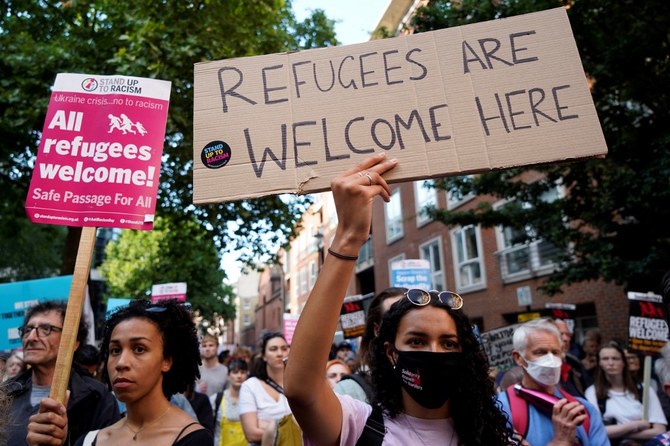Britain’s Supreme Court has ruled that the government’s controversial plan to send some migrants on a one-way trip to Rwanda is illegal.
Five justices on the country’s top court said Wednesday that asylum-seekers would be “at real risk of ill-treatment” because they could be sent back to their home countries once they were in Rwanda.
The ruling is a major blow to a key government policy that has drawn international attention and criticism.
Britain and Rwanda signed a deal in April 2022 to send some migrants who arrive in the UK via crossing the English Channel to the East African country, where their asylum claims would be processed and, if successful, they would stay. No one has yet been sent to the country as the plan was challenged in the courts.
Britain’s government argues that the policy will deter people from risking their lives crossing one of the world’s busiest shipping lanes, and will break the business model of people-smuggling gangs.
Opposition politicians, refugee groups and human rights organisations say the plan is unethical and unworkable.
No one has been sent to Rwanda as the plan has been argued in the courts. The first deportation flight was stopped at the last minute in June 2022 when the European Court of Human Rights intervened.
Wednesday’s decision will be the end of the road in the British courts, but the losing side can seek to appeal to the European Court of Human Rights.
Much of Europe and the United States is struggling with how best to cope with migrants seeking refuge from war, violence, oppression and a warming planet that has brought devastating drought and floods.
The UK receives fewer asylum-seekers than many European nations, including Germany, France and Italy. Thousands of migrants from around the world travel to northern France each year in hopes of crossing the Channel. British Prime Minister Rishi Sunak had pledged to “stop the boats” as a core part of his political party’s philosophy.
More than 27,300 migrants have crossed the Channel this year, with the year’s total on track to be fewer than the 46,000 who made the journey in 2022. The government says that shows its tough approach is working, though others cite factors including the weather.
The Rwanda policy was championed by former Home Secretary Suella Braverman, who was fired by Sunak on Monday over a series of intemperate statements that deviated from the government line. In the weeks before her sacking she described migrants as a “hurricane” headed for Britain, called homelessness a “lifestyle choice” and accused police of being too lenient with pro-Palestinian protesters.
Braverman has called for the UK to leave the European Convention on Human Rights and its court if the Rwanda plan is blocked. Her departure makes that less likely.
A court ruling against the government will be a test of new Home Secretary James Cleverly on his third day in the job.
The UK government says it aims to strike similar deportation deals with other countries if the Rwanda plan succeeds. It argues several other European countries are considering similar ideas, with the European Union exploring setting up processing centres on the bloc’s borders to screen people as they arrive.
 Protesters hold placards as they gather outside the Home Office in central London on June 13, 2022, to demonstrate against the UK government's intention to deport asylum-seekers to Rwanda. - UK campaigners get their last chance in court on Monday to stop the government's first flight of asylum-seekers to Rwanda. The government is vowing to push ahead with the first planeload of 31 claimants, on a chartered flight Tuesday from an undisclosed airport in Britain. (Photo by Niklas HALLE'N / AFP)
Protesters hold placards as they gather outside the Home Office in central London on June 13, 2022, to demonstrate against the UK government's intention to deport asylum-seekers to Rwanda. - UK campaigners get their last chance in court on Monday to stop the government's first flight of asylum-seekers to Rwanda. The government is vowing to push ahead with the first planeload of 31 claimants, on a chartered flight Tuesday from an undisclosed airport in Britain. (Photo by Niklas HALLE'N / AFP)
